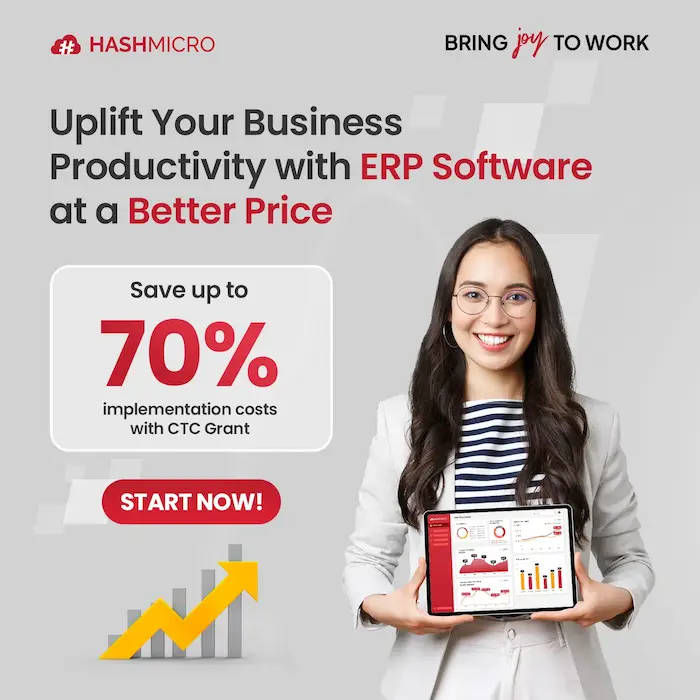If you’re already here reading this article, you might be considering using cloud-based ERP, right?
Cloud-based ERP (Enterprise Resource Planning) is a software that is accessible via the Internet. It provides companies with the capability to access their essential applications from any location and at any time, offering extensive scalability and opportunities for innovation.
In this digital era, especially in Singapore with its dynamic business landscape, we understand the need for a comprehensive system for your business. You’re looking for something that not only supports your business processes but is also practical and easily implementable.
That’s likely why you landed on this article, seeking more insight into cloud ERP systems.
So, in this article, we’ll delve into the meaning of cloud ERP, its benefits, potential challenges, and the ideal timing for its complete implementation.
Key Takeaways
|
Table of Content:
Table of Content
What is Cloud ERP and Why Choose it Over the Other Types?
Cloud ERP, or cloud-based ERP, is an ERP system installed and managed by a cloud-based data center vendor.
This vendor takes responsibility for applications, databases, operating systems, servers, security updates, antivirus, and enhancing features like disaster recovery.
In essence, you can use this ERP system to streamline all business activities without the hassle of dealing with technical IT issues.
At this point, you might wonder, “What’s the difference from on-premise ERP?” or “If both offer similar benefits, why choose cloud-based ERP?”
The significant difference lies in data access and storage location.
- With On-Premise ERP, all data and applications reside on the company’s own servers.
- Meanwhile, with Cloud ERP, everything is stored in the vendor’s data center and accessed via the Internet.
In summary: Complete control lies with the company using on-premise ERP but requires a specialized IT team if systems and hardware encounter issues.
On the other hand, cloud ERP offers flexibility and easy access from anywhere with an internet connection, without the need for additional hardware. However, the company doesn’t have full control as the vendor manages software updates.
Is this clear enough? If you feel this explanation hasn’t fully addressed your questions, check out the “Easy Introduction to Types of ERP Software” for a more detailed discussion of their differences.
Important reminder: Choose an ERP system that can evolve with your business progress. This way, you can focus more on business strategies and development rather than just dealing with complex IT infrastructure.
Among the various Cloud ERP vendors available, HashMicro also provides an ERP product that could be an option if you’re considering transitioning from other ERP types to Cloud ERP. You can also get an idea of the system’s pricing including support by the Singapore government through the CTC grants and EDG by clicking on the banner below:
The Long-Term Benefits of Using a Cloud ERP for Singaporean Business
A significant concern often faced by business owners when deciding to adopt an ERP system is: “Will the costs I incur be worth the results I obtain?“
In this section, we aim to assure you that investing in a Cloud ERP system is not a wrong choice; instead, it enhances your company’s efficiency for the long haul. Let’s delve deeper into the advantages of cloud-based ERP.
1. Trimming overall operational costs
Without a cloud services system in place, we know everything has to be done manually. Consequently, the number of employees and the time required unavoidably increase. The result? Escalating operational costs.
Then, what’s the solution? Automation.
However, on-premises ERP involves initial costs for servers, database creation, initial implementation, consultants, IT staff, and security. In contrast, cloud-based ERP is usually 30% cheaper because the vendor handles the infrastructure and maintenance.
2. Optimizing scalability, accessibility, and efficient business adaptation
We understand that as a company grows, its business processes evolve. Typically, these processes become more numerous and complex.
Whether it’s introducing new business lines or developing existing products.
With cloud-based ERP, we don’t want to hinder the progress happening within your business.
In essence,
With ERP on the cloud, your company can easily expand without worrying about adding servers.
Moreover,
Another advantage of cloud-based ERP is accessing real-time business information from anywhere and any device, expediting decision-making processes.
Lastly,
Cloud-based ERP is more easily customizable and integrated with other products, enabling businesses to adapt to dynamic industry changes.
3. Avoiding data breach risks
Many might think that the risk of data breaches is higher with cloud-based ERP due to internet connectivity.
However, that’s a misconception that needs clarification.
In reality, cloud-based ERP providers or vendors deeply understand the importance of safeguarding their customers’ data. Consequently, security in this system is a top priority for these vendors.
If you’re still unsure, you can evaluate your chosen ERP vendor based on their ISO certifications. In short, ISO is a standard that ensures system quality, information security, and other management practices align with international standards.
Therefore, this certification can guide you in selecting a cloud-based ERP vendor for your business.
Did you know? HashMicro is one of the cloud-based ERP providers with three ISO certifications: ISO 27001 (information security management), ISO 27017 (cloud service security controls), and ISO 27018 (protection of personally identifiable information data), ensuring a secure and reliable ERP solution.
Challenges That May Arise During Cloud ERP Implementation
Despite numerous advantages, Cloud ERP isn’t without its obstacles. The implementation process of this system requires careful planning and execution to ensure all applications are correctly linked, and data is securely transferred.
Let’s explore some key challenges of integrating cloud-based ERP:
1. Ensuring a smooth transition process
The adaptation and training process when switching to a new system are crucial stages for any company during system implementation. When done inadequately, the outcomes might not be optimal.
Hence, it’s crucial for companies to select a cloud-based ERP service provider that offers full support during the transition period.
This support might include employee training on using the new system and providing resources like tutorials or FAQs. These steps ensure a smooth transition to the cloud ERP solution.
2. Dependency on cloud ERP providers
As previously explained, opting for a cloud-based ERP means the primary system control lies with the vendor, and the company doesn’t have full control.
Therefore, the company needs to maintain constant communication with the vendor if they require assistance with the purchased system.
Hence, it’s vital for companies to ensure they choose a reliable cloud ERP vendor for technical support and system maintenance.
3. Data migration challenges and integration with other systems
All business processes in your company are interconnected.
For instance: The accounting process would certainly be linked to supply chain management, which includes procurement, inventory, and warehouse management.
Therefore, data migration and integration into other systems can be a challenge, especially if your company previously used a different system.
The solution lies in ensuring from the outset whether the cloud ERP system can be integrated with existing systems and has an integrated system package that aligns with your entire business.
Switching to the Best Cloud ERP System for Singaporean Business with HashMicro
The rapid changes in the digital era demand businesses to consistently innovate. With the many advantages of cloud-based ERP, modern businesses gain the necessary solutions for adaptation and growth.
However, it’s crucial for you to carefully select the type of ERP that aligns with your business needs. This decision stands as a long-term investment for your business’s progression.
If you still have doubts and need to discuss the business issues you’re facing, please click here to engage in a discussion with our expert team and get a free demo of the Cloud ERP System right away.

Frequently Asked Questions About Cloud ERP for Singaporean Businesses
What are the main benefits of implementing Cloud ERP?
The primary advantages of Cloud ERP include easier access and flexibility in managing company data. Embracing the cloud model enables companies to reduce physical infrastructure costs while gaining real-time access to critical information from anywhere, fostering better collaboration among geographically distributed teams.How can Cloud ERP enhance operational efficiency?
Cloud ERP facilitates smoother integration of business processes, reducing redundancy, and expediting access to key data. By consolidating functions like finance, manufacturing, inventory, and human resources into one platform, companies can save time, minimize human errors, and boost productivity with more structured workflows.Is data security a concern in Cloud ERP?
Yes, data security is a primary focus in Cloud ERP solutions. Cloud service providers typically maintain strict security protocols, including data encryption, continuous security monitoring, and compliance with industry security standards. However, companies also need to adopt internal security practices to safeguard their sensitive data.How can Cloud ERP support company scalability?
Cloud ERP allows companies to expand or decrease capacity and features as needed without significant investments in new hardware. The ability to adjust software according to company growth or changes becomes easier, providing the necessary flexibility in an ever-evolving business environment.Are there other benefits to be gained from Cloud ERP besides efficiency and scalability?
Apart from operational efficiency and scalability, Cloud ERP enables companies to implement advanced data analytics and artificial intelligence (AI) for deeper insights. By comprehensively analyzing data, companies can make smarter decisions, forecast market trends, and respond to market changes more swiftly.




















